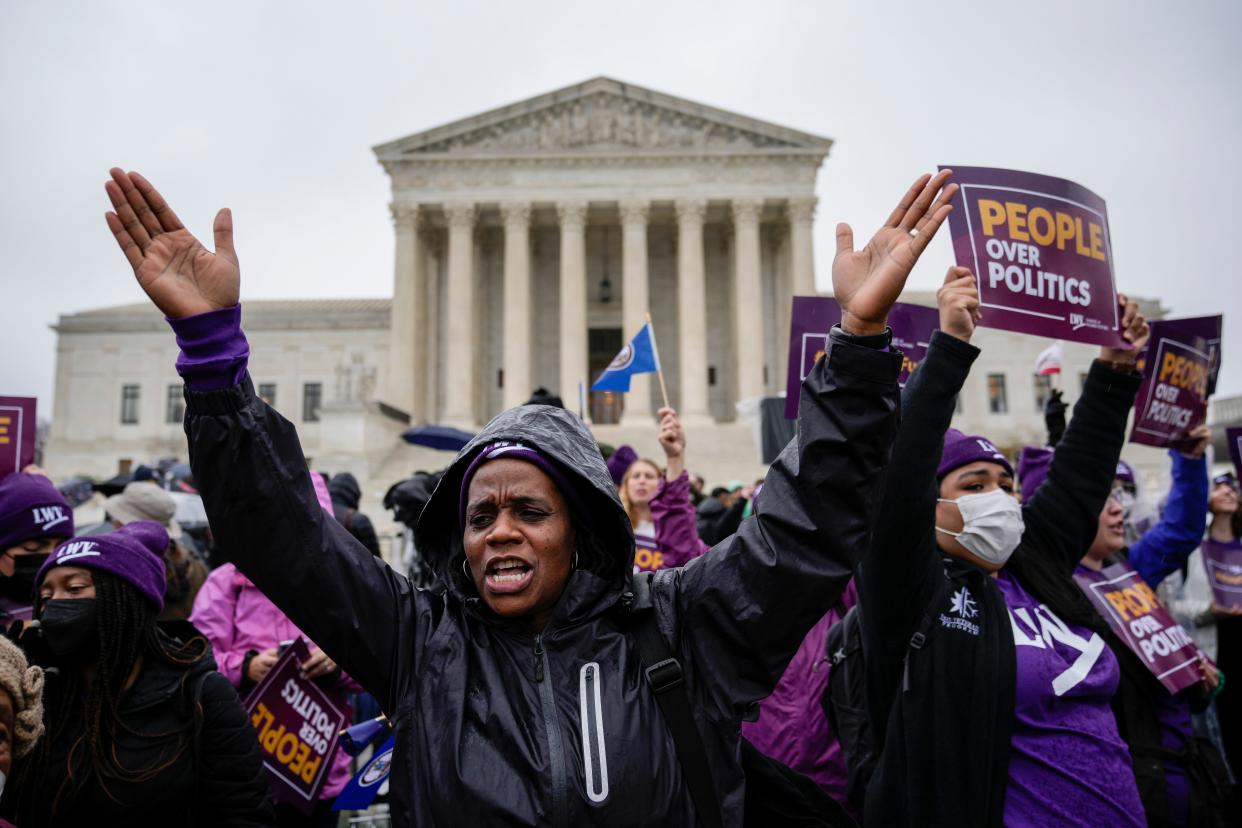Supreme Court misuses history on abortion and guns, says Fayetteville prof.

- Oops!Something went wrong.Please try again later.
- Oops!Something went wrong.Please try again later.
- Oops!Something went wrong.Please try again later.
For the past few years, I’ve been fortunate enough to write occasional pieces for The Fayetteville Observer. As I think through episodes from America’s past that shed light on what’s happening now, my standard mode is either to soothe — arguing that whatever’s stressing people out follows longstanding American ideals — or to warn — suggesting that a current trend defies those ideals.
This kind of historical thinking goes back a long way. Lacking the authority of a monarch to back up their ideas, America’s founders found authority in the past itself. There’s a reason the writers of the Federalist and Anti-Federalist Papers adopted Roman pen-names: “Publius” and “Brutus” were telling their countrymen that the Constitution would either uphold or betray the legacies of their democratic predecessors.

There’s also a reason so many schools, including Methodist University where I work, require that students take at least one history class: thinking about history is an essential part of the founders’ vision of democracy.
So it pains me to write the following sentence: America’s Supreme Court Justices should give history a rest.
I say this at a time when the Supreme Court of the United States (SCOTUS) is uniquely fixated on history. The court is dominated by “originalism,” the theory that wants justices to base their rulings on the “original meaning” of a law or amendment at the time it was adopted.
More:Don’t call it a museum and 3 other themes about Fayetteville’s history center
The theory started out as a conservative attempt to reign in the “living Constitution” that gave us decisions like Brown vs. Board of Education. Yet it now defines debate across ideological lines: the liberal justice Ketanji Brown Jackson is adept at contrasting the intent of the framers of the Thirteenth, Fourteenth, and Fifteenth amendments with that of slaveholders like James Madison. As Justice Elena Kagan has said (with a dash of wry humor), “we’re all originalists now.”
From one perspective, this is a historian's dream: Finally someone in power will listen to us!
But history done badly has nightmarish potential. Two cases from last year, plus one more on the horizon, show the folly of claiming the mantle of history without reckoning with its complexity.
The first is Dobbs v. Jackson Women's Health Organization, in which Justice Samuel Alito overturns Roe v. Wade by arguing that “the right to abortion is not deeply rooted in the Nation’s history and tradition,” based on what he calls “an unbroken tradition of prohibiting abortion.”
But this is hogwash. From before the founding through the Civil War, lawmakers accepted abortion before “quickening,” when a woman felt the fetus move — usually around three months. (And, as scholars have shown, knowing this depends on understanding context, where states defined “pregnant women” as women “quick with child.”)
Alito takes the fact that early Americans legislated against abortion in the second trimester to mean they intended to ban abortion “at all stages of pregnancy.” It's like deciding that a law that prohibits speeding actually prohibits driving.
In the second case, New York State Rifle and Pistol Association v. Bruen, Justice Clarence Thomas decides that the Second Amendment includes the right to carry a handgun outside the home, on the grounds that historically “American governments simply have not broadly prohibited the public carry of commonly used firearms.”
But there is nothing simple about America’s history of gun regulation. Lots of places left gun possession unregulated, but lots of places — cities and towns, especially — prohibited carrying firearms.
Both opinions commit basic historical errors, the kinds of things my students learn in their freshman surveys not to do. Alito and Thomas cherry-pick and misinterpret evidence, ignore evidence that counters their assumptions, and make little effort to consider what words or laws meant in context.
In the classroom, these errors are teaching opportunities: They remind us to approach the past, and our fellow human beings, with humility. On the Court, they empower people little burdened by humility to use even less of it.
The third case shows how dangerous this can be. In Moore v. Harper, whose decision will arrive this spring, the Court will decide whether North Carolina’s state Supreme Court can strike down our gerrymandered election map.
The historical problem here is that the legislature’s lawyers are relying on the “Independent State Legislatures theory,” which suggests that because the Constitution’s elections clause says “The Times, Places and Manner of holding Elections . . . shall be prescribed in each State by the Legislature thereof,” that the legislature's will is absolute — even if it violates the state Constitution!
But as one commentator writes (and as anyone who’s studied the shift from the Articles of Confederation to the Constitution knows), “The framers famously distrusted state lawmakers…. The framers would not have established… a regime that would permit state legislatures to regulate federal elections without… checks and balances.” Once again, context matters: when the framers wrote “legislatures,” they meant “government,” including governors and courts.
The only way to validate the Independent State Legislatures theory is to misread evidence and ignore context, things Justices Alito and Thomas seem all too comfortable doing.
The founders loved history, but it didn't paralyze them.
In Bruen, Thomas makes history the only test of future gun regulations, writing that lawmakers may regulate firearms only in ways “consistent with this Nation’s historical tradition.”
But if he and his colleagues were to investigate America's historical tradition the way historians do, they might discover that the founders were complicated people whose ideas rarely corresponded precisely to our own political leanings. They might also consider that a people and a nation born of revolutions ought to be open to a future that is unlike the past.
Patrick W. O’Neil is Associate Professor of History at Methodist University.
This article originally appeared on The Fayetteville Observer: Supreme Court misuses history on abortion and guns, says Fayetteville prof.

